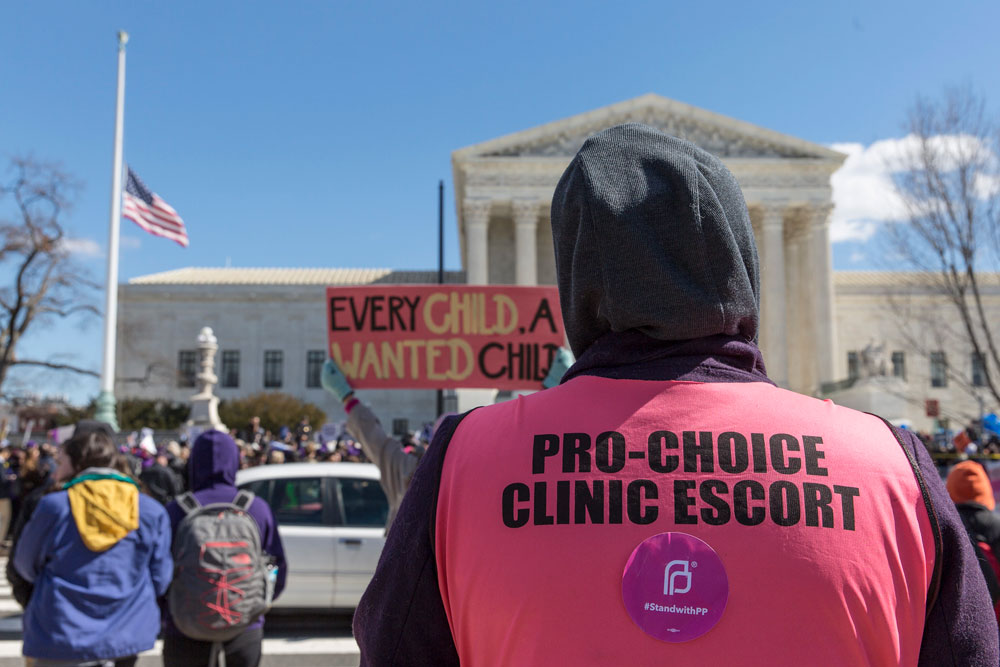
May 23, 2019; MSN News and Arizona Capitol Times
Even as the Supreme Court bides its time on wading into the abortion question, Missouri faces the loss of its last abortion clinic in that state and neighboring states prepare to try to respond. In Illinois, lawmakers move to expand abortion rights.
Across the country, activity on both sides of the issue is tensely ratcheting up. As huge crowds rallied outside the Arizona capitol on May 21st to protest abortion bans and draconian laws passed in other states, inside the capitol, yet another twist in the women’s healthcare and rights to abortion saga was unfolding.
HB2579 and SB1547, mirror bills introduced Tuesday afternoon as senators and representatives prepared to begin debating and voting on an $11.8 billion budget, would allocate $7.5 million for pregnancy services that pro-choice advocates warn will offer a one-sided and biased take on how to handle their pregnancies.
Backed by the anti-abortion lobbying group Center for Arizona Policy, the bill would create a “family health pilot program.” The Department of Health Services would distribute $2.5 million annually for the next three years to an unidentified nonprofit tasked with referring pregnant women to various health and social services.
The irony here is that although the program seeks to push low-income women to carry pregnancies to term, it’s wrapped in economic justice posturing. It will not provide actual healthcare but will refer them to existing social services. However, it cannot refer anyone to any agency that provides or refers to abortion services.
The kinds of pregnancy counseling centers being used as models—the likely recipients of the Arizona funds—are largely unregulated crisis pregnancy centers.
Sign up for our free newsletters
Subscribe to NPQ's newsletters to have our top stories delivered directly to your inbox.
By signing up, you agree to our privacy policy and terms of use, and to receive messages from NPQ and our partners.
Sen. Lisa Otondo (D-Yuma) said she found it “quite ironic” that the Legislature didn’t know if the center in the pilot program would be licensed given that Arizona requires abortion providers to meet strict regulations. “We’re going to be giving $7.5 million to something that we don’t even know if it’s a licensed health care facility, and I just wanted to make that point,” she said.
The organization that may take the lead in managing this initiative for Arizona is the Texas-based Human Coalition. The program has an annual budget greater than $10 million dollars and offers pregnant mothers support groups and financial counseling. While it is not named in the legislation, Human Coalition is the only agency that has been discussed by those who crafted this legislation.
And to make sure that nothing slips through the cracks and no Arizona women find their way to the full compendium of options when making decisions about their pregnancies, SB1547 and HB2579 contain one more twist: They do away with funding for Arizona 211, a hotline that refers people to services in their community. A Republican senator sought to restore funding for the program but was opposed due to concerns that 211 could refer people to abortion clinics.
In a statement, Jodi Ligget, the vice president of public affairs for Planned Parenthood Arizona said, “Instead of funding the 211 system that has operated in Arizona since 1964, the Republican leadership is proposing budget bills, SB1547 and HB2759, to fund faux health centers. This bill is simply to appease the Center for Arizona Policy.”
Cathi Herrod, president of the Center for Arizona Policy, an anti-abortion lobbying group, has been directly associated with the development of this bill. She views this as justified, since Planned Parenthood receives government funds to provide women’s health services, so the state should also fund services that present abortion alternatives. Planned Parenthood would claim to already do that. Planned Parenthood provides pregnant women with all the available options, whereas crisis pregnancy centers that would be directed to be the hotline proposed by Herrod would leave women “steered toward one decision and one decision alone.”
As this drama unfolds, it’s likely this will become signed law. It will be adjudicated in the federal courts. And low-income women in Arizona who have limited options for reproductive healthcare will be left with even fewer.—Carole Levine













